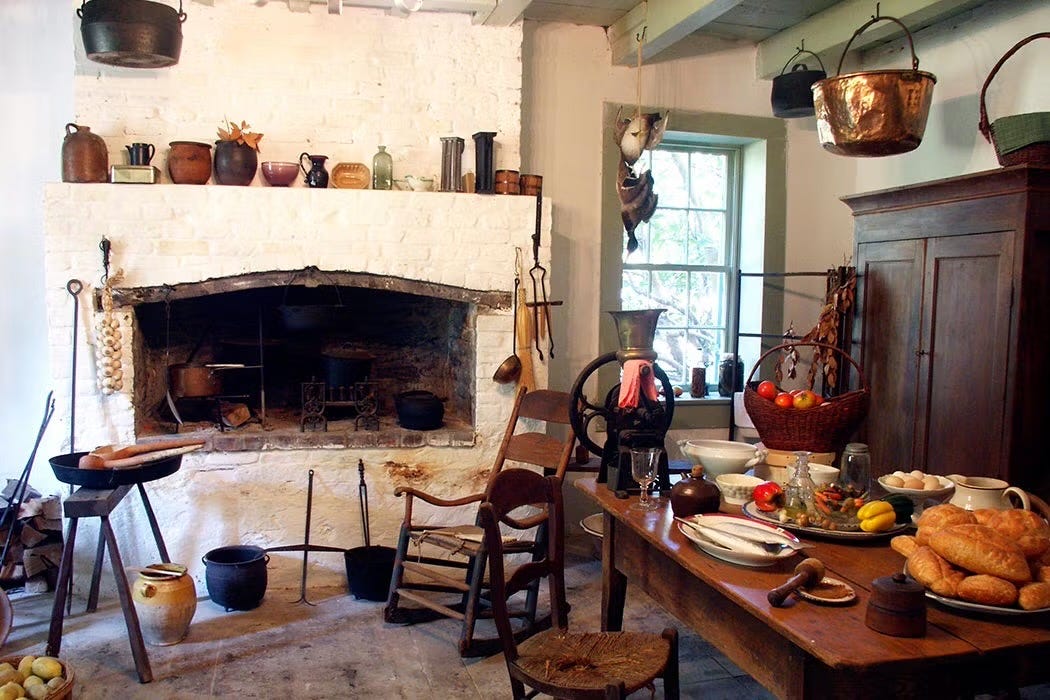The fire is never truly out. I banked it last night, covering the embers with ash, and now I kneel in the gray morning light coaxing it awake. The room is smoky and my hair smells of it. Sparks leap when I blow too hard. The children are restless already, calling for food, but nothing comes quickly. Breakfast is a negotiation with flame, with wood that is damp from last night’s rain, with a body that is tired before the day even begins.
The hearth is the center of this world. A great iron crane swings out like an arm, kettles hanging, their handles warm from the last use. I grind corn with a mortar and pestle, heavy in my hands, the dull thud echoing. Cornmeal is what we have most days. Mush or johnnycakes, stirred with water, salted, sometimes sweetened with molasses if we can afford it. Wheat flour is scarce and costly. Corn is steady, reliable, humble. I stir with a long wooden spoon, the handle blackened from years of leaning against the hearthstone.
Eggs are gathered from the yard, if the hens have been generous and the fox has not been quicker. They fry in bacon grease, the smell rising and clinging to the rafters. Salt pork simmers in a pot, tough but filling. If we lived by the coast, I might have oysters or fish. If we lived closer to a city, there would be bread from a baker. But here, I make do with what this land offers, with what my hands can prepare.
This is not romantic. The fire singes my wrists when I lean too close. The heavy iron pots strain my arms. Ash settles in the food if I am careless. I sweat even on the coldest mornings. The work is endless, and it begins before dawn. Enslaved women did this same work in kitchens far larger than mine, cooking for families who would never recognize their skill, feeding others before eating themselves. Indentured servants, too, rose in the dark to grind and stir, their labor binding them in silence. History hides their names but the porringers and kettles they touched remain.
When I walk through a house museum today, I see those tools displayed under soft light. A pewter porringer polished to a quiet gleam. A cast iron skillet resting on a reconstructed hearth. A redware mug with glaze pooling at the lip. Visitors step into the kitchen and breathe in the faint smoke smell from the fire set for demonstration. They see interpreters in gowns and aprons, sleeves rolled, stirring pots just as I did. This is living history. The food is not a performance, it is knowledge passed hand to hand. To stir cornmeal mush is to speak in the language of survival.
Books record laws, wars, treaties. But food carries what is too ordinary to be written down. Recipes whispered, ingredients substituted when the ship did not arrive, meals stretched to fill bellies during winter. To cook breakfast in colonial America was to know intimately the balance of labor and love, scarcity and abundance. And it is through food that we can remember most honestly.
When I eat pancakes today, light and fluffy with syrup poured thick, I think of johnnycakes—denser, grittier, cooked on an iron griddle over open flame. When I sip coffee, roasted evenly, sweetened with cream, I think of beans scorched in a skillet and ground coarse with a mortar. When I bite into a piece of buttered toast, I think of bread as luxury, not guarantee. History lives not just in archives but in our kitchens, in what we eat and what we forget we once had to fight for.
Breakfast in colonial America was not charming. It was work. It was burned fingers, aching arms, the stubborn fire that refused to catch. But it was also continuity. A mother stirring cornmeal at dawn. A daughter learning to bake bread on the hearth. An interpreter today showing visitors how to cradle an iron pot with a hooked handle so you do not scorch yourself. These motions are memory. These flavors are archives.
The next time you butter your toast, or pour milk over cereal, remember that breakfast has always been history. It is not only something we eat. It is something we inherit. It is the fire that wakes before we do.



This one. This is it. Food for the soul.
We don't realize how lucky we are with daily abundance.
But this is not a given, or it will not always be.
Thank you for your words, and your stories.
Ahhh, Emm,I've so many fond memories of colonial 🇺🇸 (and 🇨🇦) sites and the people who staff them over the years! Merci beaucoup for penning this tribute to all that they are (for lack of a better phrase). Do you have a fave? Colonial Wburg doesn't count! 😆